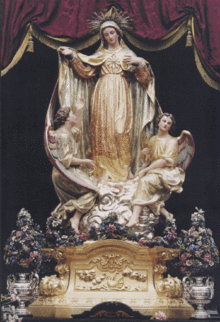Our Lady, Star of the Sea
Our Lady, Star of the Sea is an ancient title for the Virgin Mary, mother of Jesus Christ. The words Star of the Sea are a translation of the Latin title Stella Maris.
The title is used to emphasize Mary's role as a sign of hope and as a guiding star for Christians, and also for gentiles, whom the Old Testament Israelites metaphorically referred to as the sea, meaning anyone beyond the "coasts", or, that is to say, the borders of Israelite territory. Under this title, the Virgin Mary is believed to intercede as a guide and protector of those who travel or seek their livelihoods on the sea.
This aspect of the Virgin has led to Our Lady, Star of the Sea, being named as patroness of the Catholic missions to seafarers, the Apostleship of the Sea, and to many coastal churches being named Stella Maris or Mary, Star of the Sea. This devotion towards Our Lady with this ancient title is popular throughout the Catholic world.
Etymology and history
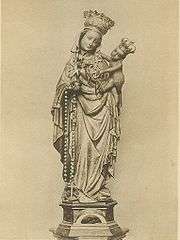
Stella Maris "sea-star" is a name of α Ursae Minoris or Polaris, the "guiding star" (also "lodestar", "ship star", "steering star", etc.) because it has been used for celestial navigation at sea since antiquity. The name is applied to the Virgin Mary in Saint Jerome's Latin translation of the Onomasticon by Eusebius of Caesarea,[1] although this is in fact a misnomer based on a transcription error. For reaching this meaning the Hebrew name Miryam had to go through a series of transformations: in Judeo-Aramaic it became Maryām (מרים), and this form was rendered in Greek as Mariam (Μαριάμ) or Maria. Mariam, in Hebrew, can have the meaning of "drop of the sea" if understood as "mar-yam": מר mar is a rare biblical word for "drop" (Isaiah 40:15 is the only instance in the Hebrew Bible where it takes this meaning), and yam means "sea".[2] St Jerome adopted this interpretation and translated the name into Latin as Stilla Maris, "drop of the sea", but at some later stage a copyist transcribed this into Stella Maris, "star of the sea", and this transcription error became widespread.[3] Another opinion states that Jerome himself interpreted the name as meaning "star of the sea" or Stella Maris, by relating it to a Hebrew word for star, מאור (ma'or), from the verb אור ('or), to be light or shine.[2]
Paschasius Radbertus in the ninth century wrote of Mary, Star of the Sea, as a guide to be followed on the way to Christ "lest we capsize amid the storm-tossed waves of the sea." At this time too the plainsong hymn "Ave Maris Stella" ("Hail, Star of the Sea"), became increasingly popular.
In the twelfth century, Saint Bernard of Clairvaux wrote: "If the winds of temptation arise; If you are driven upon the rocks of tribulation look to the star, call on Mary; If you are tossed upon the waves of pride, of ambition, of envy, of rivalry, look to the star, call on Mary. Should anger, or avarice, or fleshly desire violently assail the frail vessel of your soul, look at the star, call upon Mary."[4]
Anthony of Padua also wrote of Mary as Star of the Sea.[5]
Pope Pius XII in his encyclical, Doctor Mellifluus, also quoted Bernard of Clairvaux in saying; Mary ... is interpreted to mean 'Star of the Sea.' This admirably befits the Virgin Mother.. (for) as the ray does not diminish the brightness of the star, so neither did the Child born of her tarnish the beauty of Mary's virginity.[6]
Devotional application
The idea of Mary as a guiding star for seafarers has led to devotion to Our Lady, Star of the Sea in many Catholic coastal and fishing communities. Numerous churches, schools and colleges are dedicated to Stella Maris, Our Lady Star of the Sea, or Mary, Star of the Sea.
Stella Maris Monastery, the foundation house of the Carmelite order was established on Mount Carmel, Israel, in the early thirteenth century. The abbey was destroyed several times, but a refounded Stella Maris monastery is still considered the headquarters of the order.
Devotions to this title of Mary are found in the popular Catholic hymn, Hail Queen of Heaven, the Ocean Star and the ancient prayer Ave Maris Stella. The widely sung "Sicilian Mariners Hymn", O Sanctissima,[7][8] also reflects this devotion.
Seafarers
The Apostleship of the Sea (AOS) is often known locally as Stella Maris after the name given to the many seafarers hostels provided in ports around the world. Our Lady Star of the Sea is the patron of the AOS.[9]
The Apostleship of the Sea has for many years now, been commemorating the Feast of Stella Maris, Our Lady, Star of the Sea, with Mass each year in September for seafarers. It is a day to pray for all seafarers and give thanks for their contribution to global trade. In 2016, AoS held nine Masses in England and Scotland. In his 2014 homily at a Mass in St George's Cathedral, Southwark, London, Apostleship of the Sea's Bishop Promoter Bishop Tom Burns SM said, "God speaks to seafarers through Mary, Star of the Sea, and through those in the Apostleship of the Sea who act in the name of Mary".[10]
Gallery
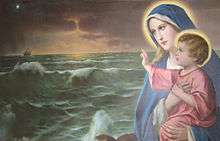 A nineteenth-century painting of Mary, Star of the Sea.
A nineteenth-century painting of Mary, Star of the Sea.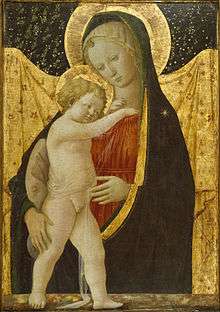 The star on Mary's robe alludes to her epithet of Stella Maris, the Star of the Sea. The Walters Art Museum.
The star on Mary's robe alludes to her epithet of Stella Maris, the Star of the Sea. The Walters Art Museum.
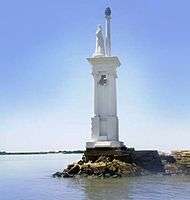
See also
| Wikimedia Commons has media related to Our Lady, Star of the Sea. |
References
- ↑ Richard Hinckley Allen, Star Names and Their Meanings (1899), p. 454.
- 1 2 Arie Uittenbogaard. "Etymology and meaning of the name Miriam". Abarim Publications. Retrieved 20 October 2015.
- ↑ Maas, Anthony (1912). "The Name of Mary". The Catholic Encyclopedia. Robert Appleton Company. Retrieved 21 December 2012.
- ↑ Hom. II super "Missus est," 17; Migne, P. L., CLXXXIII, 70-b, c, d, 71-a. Quoted in Doctor Mellifluus 31
- ↑ https://archive.org/stream/StAnthonyOfPaduaDoctorOfTheChurchUniversal#page/n57/mode/2up Huber, Raphael M., St. Anthony of Padua, Milwaukee, The Bruce Publishing Company, 1948]
- ↑ Bernard of Clairvaux quoted in Doctor Mellifluus 31
- ↑ Reed, Isaac, ed. (November 1792). "The Sicilian Mariner's Hymn to the Virgin". European Magazine and London Review. 22 (5): 385–386. Retrieved 18 October 2016.
- ↑ Herder, Johann Gottfried (1807). "An die Jungfrau Maria: Ein sizilianisches Schifferlied". Stimmen der Völker in Liedern. pp. 175–176. Retrieved 18 October 2016.
- ↑ Duricyy, Michael P., "Stella Maris: The Apostleship of the Sea", Marian Library, University of Dayton, February 3, 2011
- ↑ http://www.apostleshipofthesea.org.uk/stella-maris-mass-2014
